Dante Read online
Page 8
Dante’s equerry waited for him along with the rest of the servants. No official rank was his, but his peers stood behind him, never to the front. Arafeo stepped towards Dante, his face solemn, though his eyes could not hide his delight that his master had survived.
Arafeo was old by mortal standards and his movements showed his pain. Dante could scarce believe it; in what seemed to him like months, his young servant had transformed into an old man and would soon die. Arafeo was the sixty-seventh equerry to serve Dante. He would not be the last.
‘My lord, it is good to see you returned to the Blade of Vengeance safely,’ said Arafeo. He held out a goblet of wine in a trembling hand. Dante shook his head. Without comment, Arafeo withdrew the drink.
Sanguinius’ blank, outraged face, worn always over Dante’s own, turned to regard the dead Blood Angels with eyes of crimson glass.
‘Too many did not return. This may be regarded as a victory by the High Lords, but not by me – its price was too high. Attend to me later, Arafeo. The day’s work is not yet done. I must oversee the return of my brothers from the surface.’
Dante’s equerry bowed and withdrew. The other equerries greeted their own lords and enquired after their needs, offered refreshment in the form of wine and scented cloths to wipe clean sweaty faces freed from helmets after days of fighting. The newly masterless went to stand beside their dead lords in silent vigil, their moods sombre. More than a few of them would take their own lives later that night, such was the bond between the blood thrall equerries and their masters.
‘Karlaen!’ Dante called. The first captain lumbered over from his conference with others of his Archangels. His helmet had been removed, and this was towed behind him upon a suspensor sled by his body servant. Under the arching crag of his Terminator armour’s cowl, Karlaen’s grimy face was white, as if peering from a cave. His blue eyes gleamed, and the muscles in his cheek were tight. Dante recognised the signs of the thirst easily enough, the overwhelming passion of Sanguinius. Most of his men would be suffering from it after so hard a battle. He would discover soon enough who had been unable to resist and gone recklessly to their deaths, and who had fallen further and succumbed to the Black Rage.
‘How many of our Archangels are gone?’
‘Seven,’ said Karlaen. ‘Brothers Morfeus, Cortizae, Mestus, Brahe, Zostane, Daniaeus and Brother-Sergeant Salazari. I have twelve wounded. Twelve Terminator suits are heavily damaged, and most have suffered some injury. All but one was recovered from the battlefield, thank Sanguinius, but I will not be able to offer full deployment for several weeks.’
‘Give a more exact answer than several weeks, first captain,’ said Dante. ‘These times call for better than generalities. I need precision.’
‘I regret I cannot, lord commander.’ Karlaen shuddered, his suit exaggerating the movement. The Red Thirst nipped at his humours, making him tense. ‘Not until Lord Incarael takes the wargear into the Armoury.’
Dante searched the face of his heir apparent carefully. Six first captains had come and gone in his one thousand-year reign. Two had been lost to the ravages of the Black Rage. Karlaen exhibited no signs of that, thankfully. The commander’s own thirst lapped around the edges of his consciousness, aroused by the war against the tyranids. But his fury was tempered by crushing ennui, for Dante had waged many wars of every kind, and the thirst was background to them all. The anger he experienced most keenly was of a more human, mundane kind: that another world of the Imperium had been lost, and another light in the sky put out.
‘My lord?’ asked Karlaen, when Dante said nothing.
‘Give me a full report as soon as you are able. Go, rest. We shall convene as soon as Aphael and Phaeton return to the fleet.’
Karlaen inclined his head gratefully. ‘It would be good to be out of this war suit, commander.’ He paused. ‘You must take time for yourself, my lord. This has been a hard fight.’
‘I will rest soon enough,’ said Dante. ‘I wish to see the others and take stock of our casualties.’
‘My lord,’ said Karlaen. Dante sensed that he wished to say more, but had the good sense not to trouble his leader when he needed to grieve.
Flanked by his bodyguards, Dante walked across to the docking slot at the aft of the deck. There was one either side, so that a ship could land and take off again without changing direction. The grand space clamoured with activity. The tech-priests of the Armoury went among the battered ships, directing great gangs of blood thralls and servitors who dragged on chains attached to the block and tackles of cranes. By sheer muscle power alone, they lifted and manoeuvred Stormravens and Stormtalons onto sleds. These ran on rails so that the craft might be dragged easily into the maintenance bays set into the starboard side of the deck. The hangar deck ran through the Blade of Vengeance, just aft of amidships and directly above the larger space of the embarkation deck in the ship’s ventral spine. The hangar was protected by the projecting flank shields of the craft, while its position allowed the easy transfer of flight craft between the hangar and the embarkation deck via huge lift platforms. The maintenance bays connected the port and starboard sides of the hangar deck together, allowing repair crews easy access to both sides, while their blast shutters provided rapid means of isolating one side from the other.
The stink of oil, promethium and engine exhaust coated the back of his throat. The peppery, gunpowder smell of hard vacuum clung to the returning ships. Underlying the mixed smell of space and hydrocarbons was the tang of blood. Dante was aware of it above all else, though it made up but a part of the bouquet of the hangar deck. Every other Blood Angel would be the same. A dark impulse to feed shifted in his subconscious. The lord commander quashed it. He kept his thirst trapped in the cage of his noble soul. His control over it was total, but he could not shut it from his awareness, and it pricked at him as a thorn that could not ever be removed.
The smell of blood grew stronger as he passed a crowd of Astra Militarum troopers sat together in silence. There were a few hundred of them, of all ranks and regiments. From half a dozen worlds, they had forged a new fellowship by dint of survival, and shared it in exhaustion. When they saw him approaching, they nudged each other and stirred themselves and made the sign of the aquila. When he looked at them they called out for his blessing.
Dante kept his eyes from their wounds, swallowed back the excess saliva gathering in his throat and spoke to them. ‘Be still and rest. You have fought and won a great victory today. Heroes such as you will be lauded for all time. We of the Chapter owe you a blood debt for your efforts.’
They gave their thanks. The lines of fear smoothed from their faces. They sat a little straighter. One of the officers got to his feet, and then another, and then all their hundreds stood as one. The wounded called out to be lifted to their feet. When all stood, they saluted in their various fashions, united further in their worship of this living icon.
‘All praise Lord Commander Dante! Saviour of Asphodex! The hallowed angel!’ one shouted.
‘All praise, all praise, all praise!’ the others responded. Their lusty shouts were but a minor chord in the clashing symphony of the deck.
Dante was a modest man. He disliked the veneration given him, and the stories that had grown around his deeds, but he understood their utility and stood tall while they chanted his name. ‘Silence now. Be still,’ he said. He touched the shoulder of a blood thrall marked with the prime helix of the apothecarion.
‘Where is Dhrost? I do not see him.’
‘In the apothecarion, my lord,’ said the thrall. His eyes averted from Sanguinius’ golden mask, he kept on binding the wounds of the man he tended. ‘He is under the care of the Sanguinary Priests.’
‘How serious are his wounds?’
‘He will recover fully, my lord. He will fight again.’
‘Those are good tidings. He is of a rare sort much needed in these times. These men,’ he said. ‘Once their hurts are seen to, see they are found accommodation and refreshment. T
hey should not be left here to sit and ruminate upon their losses. They are heroes and should be treated as such. This is my command. See it is acted upon.’ He was irritated that it had not been done already, that he must order it. Designed and launched in mightier days, the battle-barges of the Space Marines had ample space for thousands, and were never full. There was no cause other than thoughtlessness to keep the men sitting in the hangar.
‘Of course, my lord,’ said the thrall.
Dante turned to address the men. ‘When the fleet is under way, you will be feasted by the Blood Angels, in honour of your courage. You will be taken from this place shortly. Rest. You are safe.’
Dante ignored the men’s entreaties to lay hands upon them, and continued towards the rear hangar slot.
Stormravens flew in and out of the hangar deck, atmospheric integrity fields shimmering around their prows as they entered the ship. These were the stragglers, units sent on missions elsewhere on Asphodex or delayed by attack and mechanical problems. Not one was undamaged. From every craft the battered remnants of his strike force emerged, carrying the wounded, the dead and salvaged wargear. Sanguinary Priests came out with their reductor capsules extended, a sign they were full of the progenoids of the dead. Some of the ships touched down, disgorged their cargoes and took off again immediately, hurrying to save brothers left behind. He watched Techmarines board one ship, off to retrieve the Chapter’s precious technology from the teeth of the enemy. From another serfs dragged several large pallets under the watchful eyes of senior Armoury blood thralls. Upon them were drop pod cogitator units. The craft were easily produced and regarded as disposable; their machine-spirits were not.
At the furthest end of the aft hangar slot, tall angelic statues were moulded into the walls. Armourglass bay windows filled the spaces between their outstretched wings and arms that protruded into the void. Dante entered the small space encompassed by glass and looked down upon the ruin of Asphodex. Knowing their master’s moods well, his Sanguinary Guard kept a respectful distance.
The ship shook with the discharge of bombardment cannons, sending withering salvoes of lava bombs into the surface of Asphodex. Dante had ordered Bellerophon to empty the ship’s magazines, and the Lord of the Heaven Gate was cleaving to his command. Asphodex’s surface was buckling under the strain, a deep fissure opening in its crust. As tectonic plates unknitted, the glow of the world’s secret fire was exposed. The Blade of Vengeance lacked the power to enact Exterminatus on the planet, but Dante would scour it with flame, leaving little for the tyranids to feast upon. Where it had not collapsed entirely, the world-city of Phodia was a raging inferno, its thoroughfares traced in flame.
Across the orange burn of world-death, organic silhouettes floated, for around Asphodex swam a shoal of corpses. The giant voidbeasts were dead, their heavy, crustacean shells cracked. Globular clouds of frozen fluids and chunks of flesh surrounded each with its own swarm of gory satellites. The frozen particulates of vented atmosphere masked the dull, clotted red of the Red Scar.
A few of the ship-beasts remained alive. The Blade of Vengeance’s escorts darted among them, finishing off those that were wounded with volleys of torpedoes. Flights of Stormhawks and Thunderhawks raced alongside their mothership, destroying ship-to-ship infiltration organisms and the directional bladders of fragmentation mines, laid like so many eggs by the xenos.
The liveliest enemy ships listed drunkenly, feeble tentacles flicking at the coldness of space without purpose. The coordination the fleets had possessed was gone. Chaos filled the absence. They were easy prey, and the guns of the Blood Angels had a surfeit of targets.
Lesser minds would see this as a triumph, but it would only be a matter of time before the ship-beasts reorganised as the swarms on the surface had. The fleet was enormous, divided into several armadas attacking each of Cryptus’ worlds. Hundreds of thousands of them had been destroyed. Too many remained, and this was but one splinter of Hive Fleet Leviathan, itself a smaller part of the greater tyranid whole. They had done no more than lop off a fingertip.
Dante dwelled on his disquiet alone.
How many more worlds would he watch die? Privately, he saw this latest tyrannic war as unwinnable. No effort was great enough. Every victory against them had been won at enormous cost, and those victories were isolated instances in long lists of defeats. Who could defy the tyranids if the Imperium did not? Not the eldar, nor the upstart tau. The former were divided, the latter’s empire too small. Neither were sufficiently numerous. The orks would rage against the Devourer, but be consumed by the voidspawn as methodically as caprids strip a meadow and turn it to a wasteland. None of the galaxy’s other myriad races were great enough to stand against them.
If they were all to come together, they would last a little longer. Dante could not envisage unity among humanity. An alliance between species strong enough to overwhelm the Great Devourer was an impossibility.
Dante lacked Sanguinius’ gift of foresight, but he could imagine a galaxy scoured of biological life easily enough, the bones of civilisations picked over by necron dynasties and other abiotic beings. Even they would not survive, but dwindle and die in the ruins. Looking out over the shattered mess of the tyranid fleet, he found it all too easy to envisage the same scene played out over the skies of Terra – a final defiance before inevitable consumption. Corbulo knew. The Sanguinary Priest had the prophetic sight. He had become withdrawn of late, and haunted looking. Dante could imagine the end. He was sure Corbulo had seen it.
For all his early life, Dante had been taught to mistrust the alien. It was true the least offensive xenos harboured a deep perfidy. Lenience towards xenos species bought a bounty of betrayal. But in all his long years, he had never truly hated them, not as some of his brothers did. Non-humans strove only to survive as mankind strove. Dante had gleaned enough of the galaxy’s history to know that more often than not, folly and hubris had undone the great civilisations of the past, humanity’s first stellar empire included, and not external threat.
Mankind had more in common with other sentient species than the adepts of Terra would admit. He supposed that was why aliens were so easy to hate. Not for him. Besides the treacheries and atrocities he had witnessed by xenos hand, he had seen nobility, honour and mercy. Twice recently, he had been forced to fight alongside the necrons against the tyranids. On neither occasion had these most arrogant of aliens betrayed the alliance. Flashes of the virtues and the graces were in all living things.
In the tyranids, he had finally found something to hate, and powerfully. His loathing for them was the strongest emotion outside of the thirst he had felt for centuries. There could be no accommodation with the tyranids, only war. They had no redeeming features. When he had seen them as beasts, he had regarded them as a problem. When he had learned of the existence of the hive mind, he had come to view them as an existential threat. Now that mind was proving to be as vindictive as the cruellest man, he had grown to despise it.
Victory might be possible, in the end, but what then? The forces of the Imperium would be so depleted as to fall easy prey to the Great Enemy, or to be overwhelmed by orks, or cast down by the metal overlords of the necron dynasties who would, he had no doubt, turn on them after any ultimate triumph.
As he looked down upon the boiling hell of Asphodex, Dante was seeing a foretaste of the end. Weariness sank deep into him, and he was glad of the support of his armour.
He turned from the window and looked out at his Chapter and their servants, already preparing for fresh conflict. They were so few, and growing fewer.
I have failed them, he thought. This is the beginning of defeat.
The losses of the Blood Angels would be great. He did not have to see the casualty reports – the broken bodies carried by grief-stricken brothers from the Stormravens told him all he needed to know. A dread crept along his limbs, bringing with it a weakness. There would not be enough of them left to defend Baal. The Chapter would be finally destroyed.
D
isturbed by his fatalism, he closed his eyes.
Lord Sanguinius, he prayed. Forgive me. I am old, and the toil of conflict has worn my soul thin, although my body remains strong. I will never falter. I will never retreat. I will never give in. If I cannot ensure a better future for humanity, then I will see it has a glorious end, defiant to the last. Forgive me my moments of doubt. Lend me the strength to overcome them.
Can he hear me? Dante thought. Is the brightest son of the Emperor somewhere now, watching me?
Sanguinius was dead ten thousand years before Dante had been born. He had prayed to him since before he had become a Space Marine. The primarch had never answered, but Sanguinius was not a god. Sometimes it was hard to remember that. At times, the words of the Adeptus Ministorum sounded true.
As if in answer to his doleful thoughts, a blaze of light shone from the centre of the deck. A wind blew in all directions. Guns were raised. Tocsins blared. Machine voices warned of intrusion, and that the deck defences were now online.
Dante’s hand gripped the handle of the perdition pistol. His guard had their angelus gauntlets pointed at the epicentre of the radiance, staring into the light unflinchingly.
The light faded to reveal a golden figure, its armour almost the twin of Dante’s, standing at the centre of the hangar deck.
‘The Sanguinor!’ boomed Chaplain Ordamael from the far side of the deck. ‘The Sanguinor is here!’
The activity in the hangar ceased all at once. Armour clanged on the deck plating as Blood Angels dropped to their knees and bowed their heads, their servants knelt beside them like children kneeling by their fathers at prayer, hands clasped so tightly their knuckles whitened.
Dante did not kneel. The Sanguinor stared at him. Broad wings of white ceramite spread either side of a face that resembled the one Dante wore. But whereas Sanguinius’ face bore an expression of anger on Dante’s helm, his mouth wide in a silent war-cry, the rendition on the Sanguinor’s was troubled, with tears of gold rolling down its cheek.

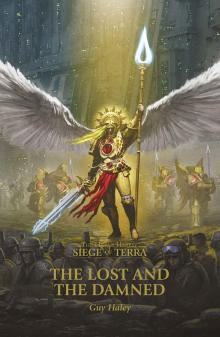 The Lost and the Damned (The Horus Heresy Siege of Terra Book 2)
The Lost and the Damned (The Horus Heresy Siege of Terra Book 2)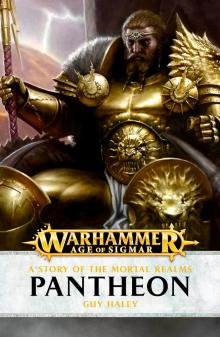 Pantheon
Pantheon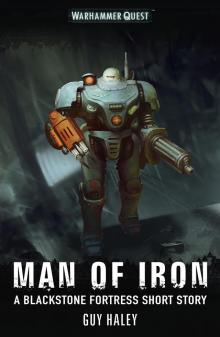 Man of Iron
Man of Iron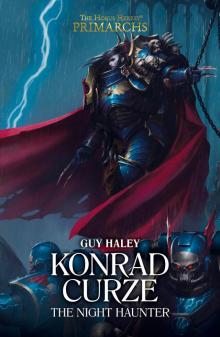 Konrad Curze the Night Haunter
Konrad Curze the Night Haunter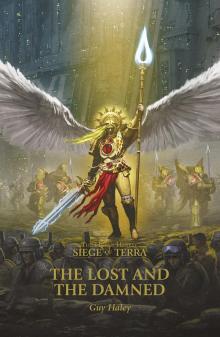 The Lost and the Damned
The Lost and the Damned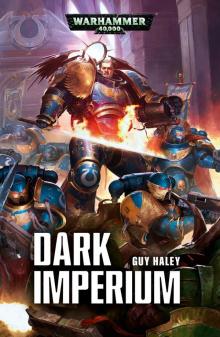 Dark Imperium
Dark Imperium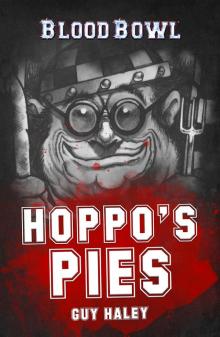 Hoppo's Pies
Hoppo's Pies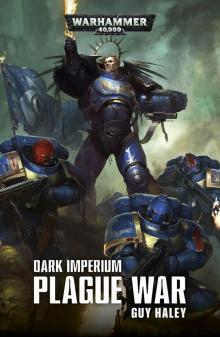 Dark Imperium: Plague War
Dark Imperium: Plague War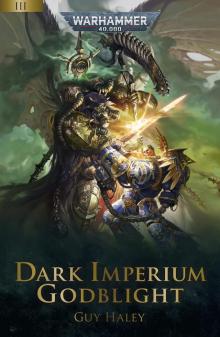 Dark Imperium: Godblight
Dark Imperium: Godblight Crash
Crash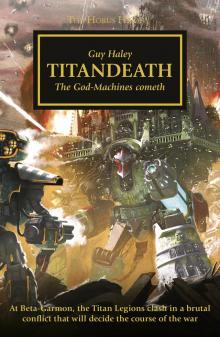 Titandeath
Titandeath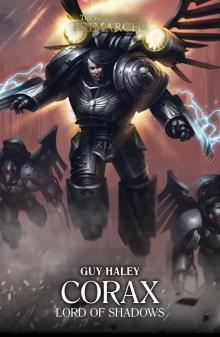 Corax- Lord of Shadows
Corax- Lord of Shadows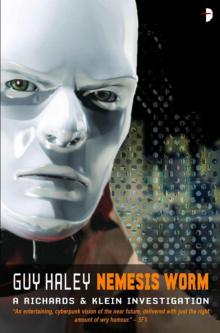 The Nemesis Worm
The Nemesis Worm Wolfsbane
Wolfsbane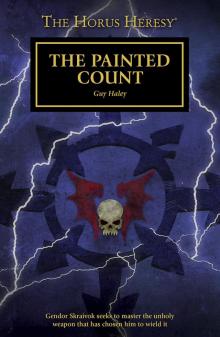 The Painted Count
The Painted Count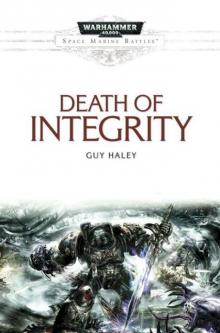 The Death of Integrity
The Death of Integrity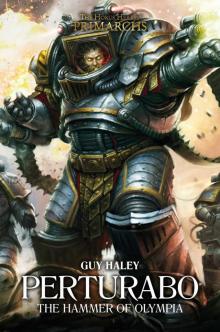 Perturabo: Hammer of Olympia
Perturabo: Hammer of Olympia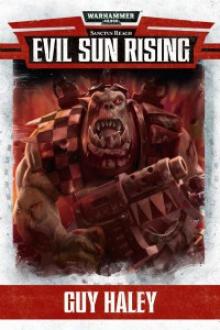 Evil Sun Rising
Evil Sun Rising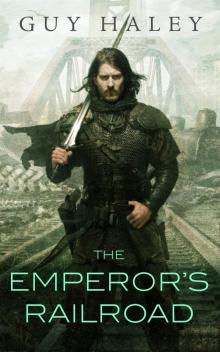 The Emperor's Railroad
The Emperor's Railroad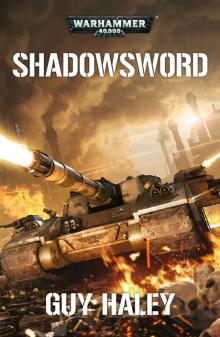 Shadowsword
Shadowsword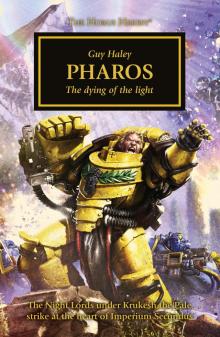 Pharos
Pharos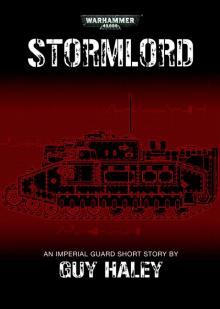 Stormlord
Stormlord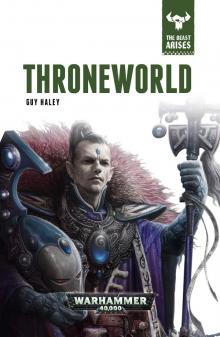 Throneworld
Throneworld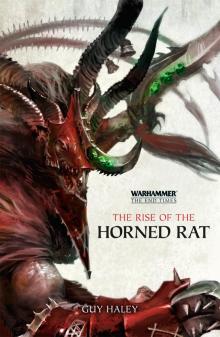 The End Times | The Rise of the Horned Rat
The End Times | The Rise of the Horned Rat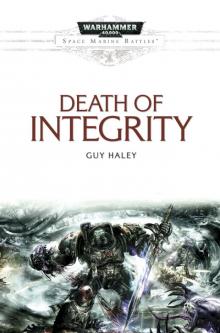 Death of Integrity
Death of Integrity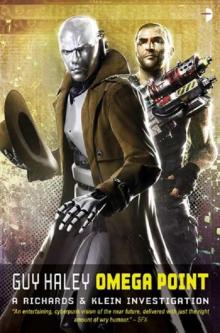 Omega Point
Omega Point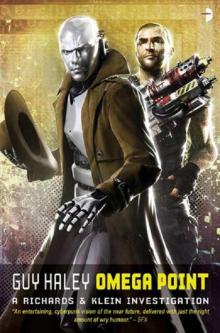 Omega point rak-2
Omega point rak-2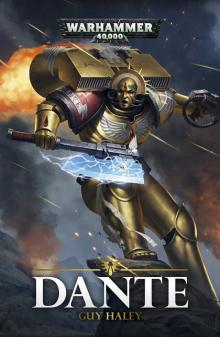 Dante
Dante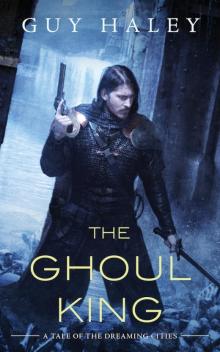 The Ghoul King
The Ghoul King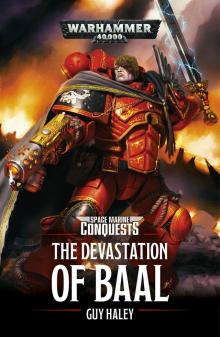 The Devastation of Baal
The Devastation of Baal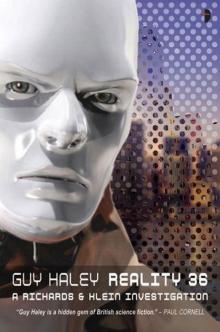 Reality 36: A Richards & Klein Novel
Reality 36: A Richards & Klein Novel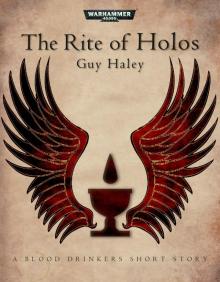 The Rite of Holos
The Rite of Holos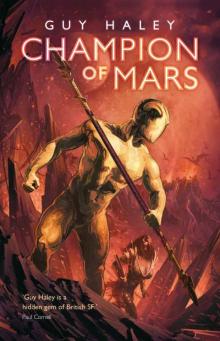 Champion of Mars
Champion of Mars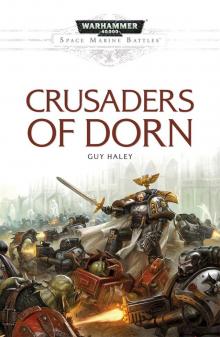 Crusaders of Dorn
Crusaders of Dorn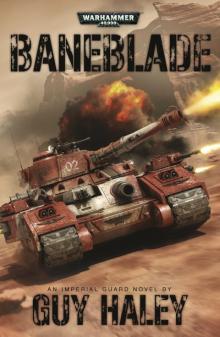 Baneblade
Baneblade